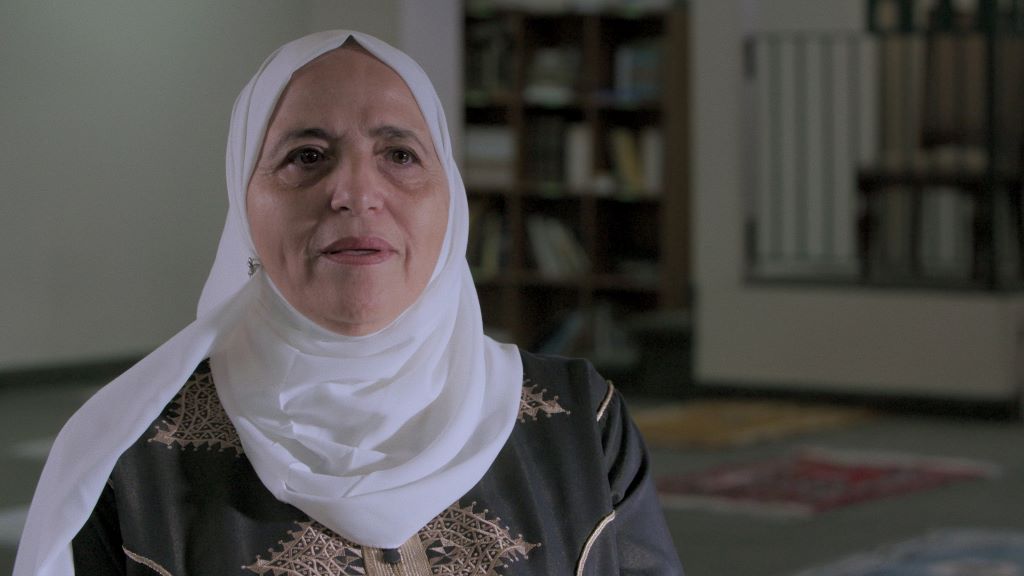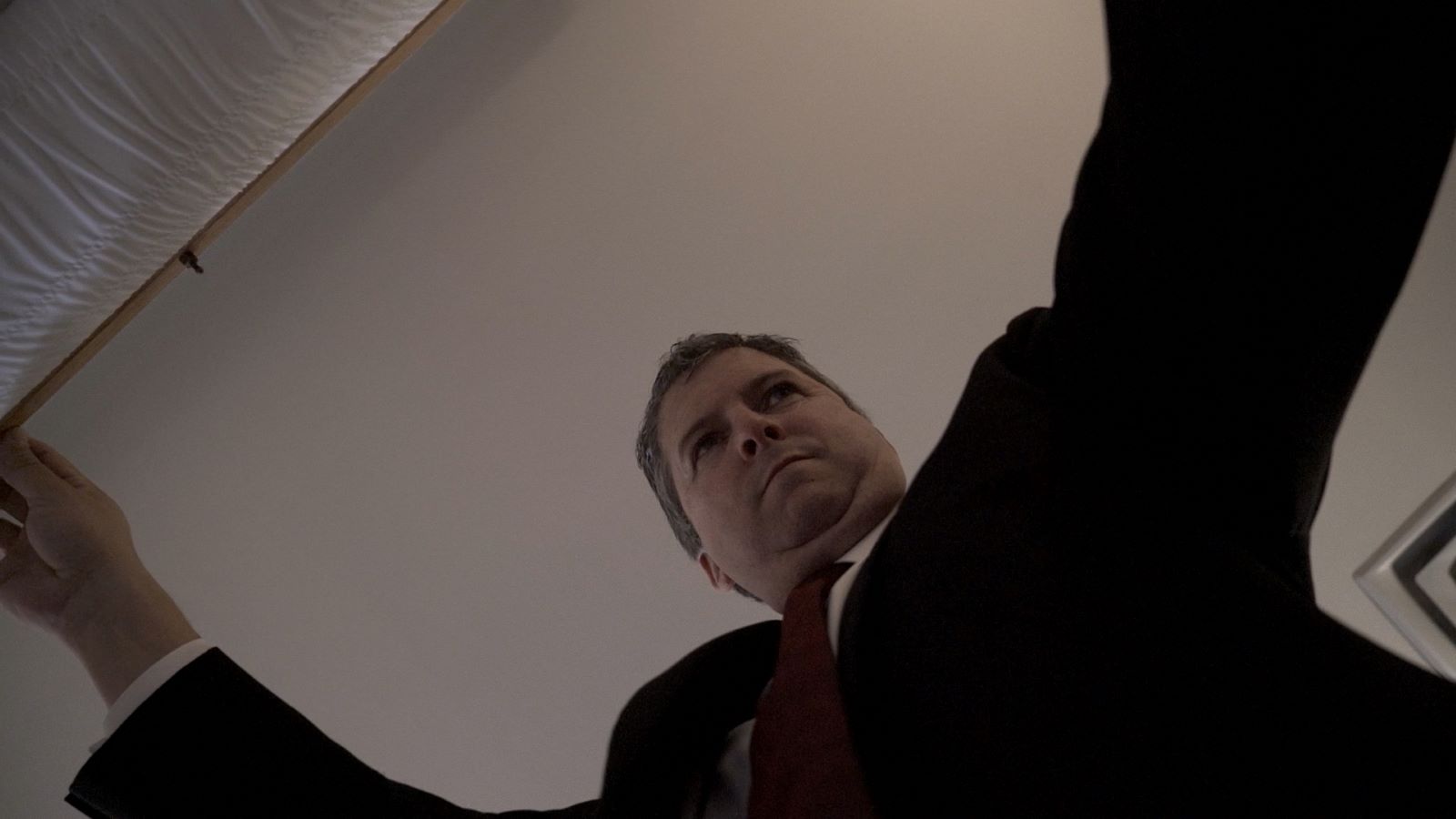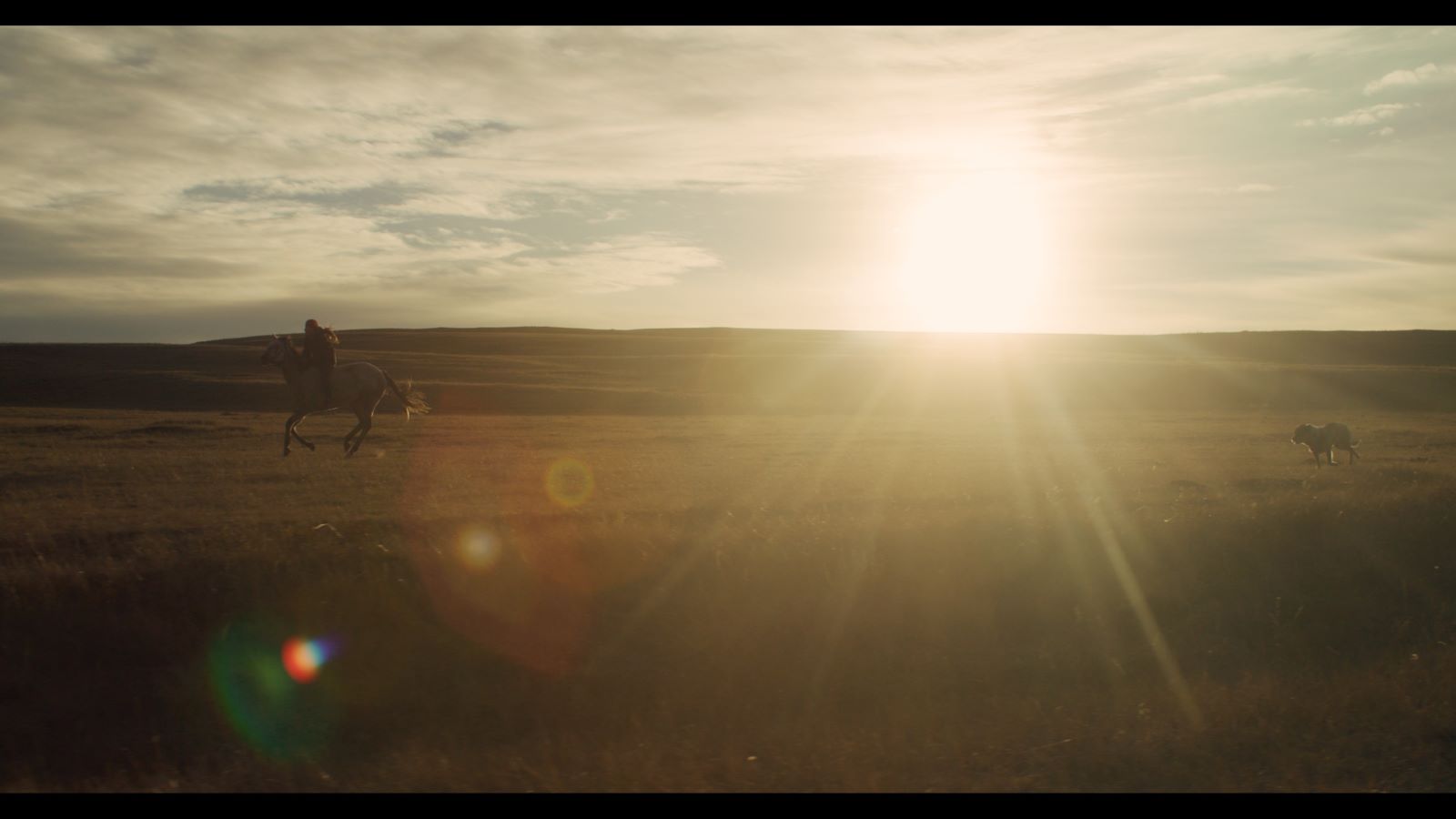“This film has such a good sense of humour,” I tell Undertaker for Life! director Georges Hannan. “I love how you use a tombstone to say the title card Fin. If that’s not an ending, I don’t know what is!”
Hannan, speaking with POV by phone ahead of the Hot Docs premiere of his NFB doc Undertaker for Life!, offers an unexpectedly fun conversation about death. Perhaps it’s inevitable, since the characters in the film have such a weird sense of humour. The film introduces audiences to a handful of undertakers in New Brunswick, along with local residents who unpack the grieving process. The film explores the rituals associated with death, and the responsibilities entailed within being the professional face for an especially difficult moment in people’s lives. Part of it is having the unflappable positivity that the undertakers need to provide for their communities.
But Hannan hones the gift for gab he’s developed by listening attentively as a sound recordist and filmmaker. Facilitating the final journey for loved ones is something that even seasoned pros need to process. While death is the premise of the film, the conversations are ultimately all about life. Considering religion, time, community, happiness and all of life’s other big questions, Undertaker for Life! gleans words of wisdom from the morticians as they keep their funeral homes shipshape for their next guest.
POV spoke with Hannan ahead of the Hot Docs premiere of Undertaker for Life!.

POV: Pat Mullen
GH:Georges Hannan
This interview has been edited for brevity and clarity.
POV: What inspired the choice to look at undertakers at this point in your life and career?
GH: That is the question that everybody asks, and it’s the question that I keep looking for an answer. I don’t think there was one day or one event. It just was a continuation of different things through life. I always like doing films on people who are misunderstood in society; people who have a weird opinion, in a way. Most people, if you ask them what career they wouldn’t do, an undertaker is probably up there. It’s always fun to work with a subject that nobody wants to touch.
My mother used to tell me this story that when she was young, they lived on an island in northern New Brunswick. There were no undertakers on the island and people used to come and knock at the door. My grandfather would just say, “I’ll wash up and come over.” She didn’t understand what was going on. She understood much later that he used to “stuff” the dead, as it was called at the time.
POV: Like, taxidermy?
GH: I think he was just blocking all the places where any fluids or whatever could come out. I don’t know if that’s too much information?
POV: A bit?
GH: You asked! It also happened that a friend of mine passed away. When I was doing research for the film, I’d go to funeral homes and then I’d spend some time with him and help out. He was in the last stage of cancer. He was staying in his living room and he couldn’t make it upstairs. I was helping out, just try to give his wife time to be able to do some errands and spend some time with him. I’d try to avoid the subject that I just got out of a funeral home talking about the meaning of life. We used to talk about all kinds of stuff, and then we got to the point where I made his last meal [lapin à moutarde, or rabbit with mustard and mushrooms] because he decided to leave. I said goodbye and I left, and that was it. He was gone. It’s a life-changing experience when you’re that close to death and you live it with someone on a one-hour, two-hour basis per day.
POV: Does your background in sound inform how you approach telling a story as a director?
GH: Oh, of course. I still do sound on my films. I like very small crews, so it’s not very intimidating for [the subjects]. I do the interviews and I’m doing the sound, and all of a sudden, I’ll hear a car coming from far away, or there’s a Harley Davidson that’s going to pass by and I know it’s going to be crazy, so my question becomes that much longer. [Laughs.] I wait until it’s passed. I’ve been in the business so long that I do the same thing with clouds. I’ll just keep talking until everything is in place and then I’ll get them to shoot the answer.
POV: I guess that probably makes the edit a bit easier?
GH: But then, in the edit, when we we’re going through all the takes, there’s so much of me talking!

POV: We don’t see the embalming process in Undertaker for Life!. It’s not like Six Feet Under. What guided the parts of the job that you show in the film?
GH: It could have been a gory film, but I don’t like gory films. I like to talk about something but show something else so that people can relate to it. There are a lot of people that you can’t bring to a funeral. They scare people and it’s subject that everybody avoids, but you need to be able to show it. But here you’ll see oil coming out of a hearse and hear [the undertakers] laughing in the same breath. In a screening, we can make it even more gory in our minds. It’s more adaptable.
POV: How did you choose your characters? There’s such good range in the cast.
GH: Most of them were chosen in the editing suite. Some of the people I talked to were employees who would say, “I’m not sure I can say that. I don’t know what my boss would say.” It’s harder to have a frank discussion when someone is afraid for their job. In the editing process, we had maybe 12 undertakers. At some point, we had to weed them out, so we ended up with these main characters. But at one point, we started going, “this person is interesting,” so then we started following them and we found that were really close. It got to a point where they wanted to talk to me. And then COVID didn’t help. But the film is not about COVID—that you see in the film as far as people not wanting to deal with death. That was there before COVID, but COVID made it worse. It was really a cry from the heart from these people who wanted to say something. It was more about grieving and what that means.

POV: And you previously made a COVID doc for the NFB with 2000 mm. How was that experience?
GH: I just picked up a camera and started walking in my neighborhood and filming during lockdown. I could have gotten a $1000 fine for working, but I’d stay on the sidewalk and I’d just shoot the signs on houses. It was like making a clandestine film. When the police would come, I would turn away. I tried to get funding and nobody would touch me with a 10-foot pole. I didn’t want to do that again.
POV: You seem to have a great sense of humour, and so do the characters in the film. What role does humour play in the way we talk about death?
GH: I don’t laugh about death. I laugh about our relationship to death. They have the weirdest jokes, as you can imagine. You know, there’s a scene where you see [an undertaker] looking into the casket and he closes the casket. I asked, “Can you just adjust something?” He was just looking at the monitor, we weren’t rolling, but he licked his thumb like your mother would do to wipe something off your cheek. [Laughs.] He knew exactly what he was doing. It’s their way of dealing with all of this. For me, it’s a way of dealing with a subject. I just have to take people by the hand and bring them through the process of watching this film and listening to this message.
POV: You previously did a film about the sex shop owners. Is it just a coincidence that you have two films that look at people in the workplace, or is this something you might continue in a series?
GH: They’re in a workplace, but what they have in common is a style that I like to work with. The other film started with a church and there’s this guy praying. He looks like Elvis and he has all these rings. He owns a sex shop. He goes to church every Sunday, and he winks at people. They follow him to the sex shop and buy stuff. I like to get different people and laugh with people. I have other ideas, like a film about used car salesmen.

POV: When you’re doing a film like this one where you have several characters discuss a theme, do you approach everyone with the same set of questions?
GH: It evolves. I try to do more than one discussion with people. It’s easier to get them to guide me where they want to go. There are certain places where I don’t want to go, of course, but we negotiate where the film is going. But then there are places you hadn’t thought about and, all of a sudden, they open a door for you. You’ll get excited and then the questions evolve. Then you get to the next person and you add the questions that the last person brought to you. It evolves as you establish trust.
It’s really the classic kind of old-style documentary. I don’t put any radio mics on people. I just use boom. If you put wires on people, half the time they’re 20 feet away and are like, “Ae you shooting? Are they looking at us? And what you hear is all garbage.” It’s about the relationship you have with the person. You’re not playing doctor with them. You’re respecting their space.
POV: Did this film shape your opinion what your sendoff might be?
GH: Of course! For me, I always say, “You’re not going to see me in a church.” But my 94-year-old mother is still living. She was a cloistered nun, one of the nuns that wouldn’t talk to anybody. She did that for two years and then they kicked her out, so she’s a very religious person—not me, but that’s another story. If I would die today and she would still be alive, I would need to do it. I’m not going to be there.
Whatever you do is for whoever’s going to be left. If she was still living and I died, I’d need to go to a church and go down the aisle. For her, that would be very important to say goodbye to her son. But once she’s gone, it’s a question of what does my spouse want? I’m a grandfather now, so what do my two grandchildren need to go through the grieving process? We use the “I” word a lot, but I keep telling people, “You’re not going to be there.” You can make a will, you can say, “This what I’d like,” but then the last sentence should be: “Whoever is dealing with this can do whatever they need.” In the end, we’re not going to be there.











